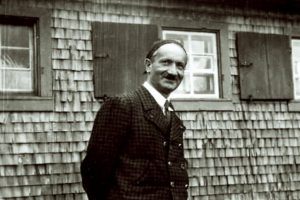David E. Cooper at the TLS:
 Martin Heidegger’s writings owe their fascination to their fusion of radical criticism of the Western philosophical tradition with a dark, trenchant diagnosis of the “homelessness” and “destitute” condition of human beings in modernity. Heidegger’s work has enjoyed unrivalled influence in a wide range of twentieth-century philosophical movements or fields – phenomenology and existentialism, pragmatism and postmodernism, hermeneutics and poetics, theology and environmental ethics. Phenomenologists and pragmatists could applaud his “destruction” of Cartesian rationalism, existentialists his call to “authenticity”, and environmentalists his reflections on “the devastation of the earth”. Heidegger’s influence might have been greater still if potential admirers had not been deterred by his challenging vocabulary or by his connection to Nazism.
Martin Heidegger’s writings owe their fascination to their fusion of radical criticism of the Western philosophical tradition with a dark, trenchant diagnosis of the “homelessness” and “destitute” condition of human beings in modernity. Heidegger’s work has enjoyed unrivalled influence in a wide range of twentieth-century philosophical movements or fields – phenomenology and existentialism, pragmatism and postmodernism, hermeneutics and poetics, theology and environmental ethics. Phenomenologists and pragmatists could applaud his “destruction” of Cartesian rationalism, existentialists his call to “authenticity”, and environmentalists his reflections on “the devastation of the earth”. Heidegger’s influence might have been greater still if potential admirers had not been deterred by his challenging vocabulary or by his connection to Nazism.
more here.
